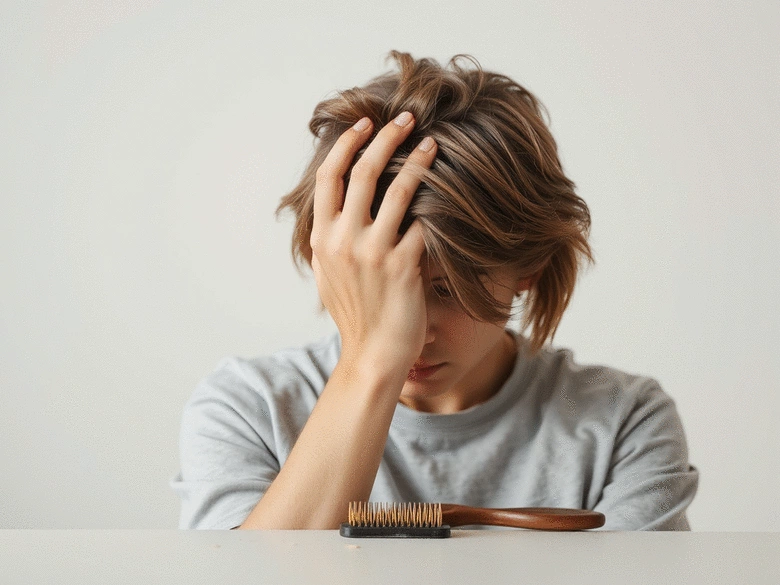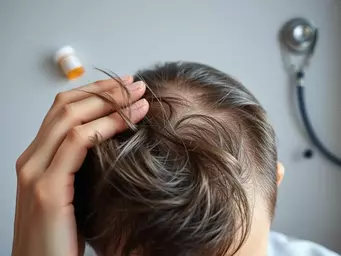Stress and Hair Loss Connection
Have you ever looked in the mirror and noticed a few more strands of hair on your brush than usual? You're not alone—many people experience hair loss at some point in their lives. Understanding what causes this can be daunting, but it doesn’t have to be. Let's dive into the fascinating world of how stress impacts hair health together.
What You Will Learn
- Stress can disrupt the normal hair growth cycle, leading to increased shedding and delayed regrowth.
- Cortisol, a stress hormone, can cause hair follicles to enter the resting phase prematurely, resulting in hair loss.
- Both emotional and physical stressors can significantly affect hair health, leading to various types of hair loss.
- Recognizing signs of stress-related hair loss early can help you implement stress management techniques to improve hair health.
The Impact of Stress on Hair Health: A Breakdown
Stress profoundly affects hair health by disrupting growth cycles, increasing shedding, and influencing biological factors. The visual below details how emotional and physical stressors, alongside hormonal changes, contribute to hair loss.
Emotional & Physical Stressors
Both types of stress disrupt normal hair growth cycles, pushing follicles into premature resting phases, leading to increased shedding.
- Increased shedding & thinning
- Delayed regrowth
- Heightened follicle sensitivity
Biological & Hormonal Impact
Stress triggers cortisol release, disrupting hair follicle stem cells and causing hormonal imbalances (e.g., estrogen fluctuations).
- Cortisol interrupts growth cycle
- Inflammation damages follicles
- Hormonal shifts lead to thinning
Understanding the Link Between Stress and Hair Loss
Have you ever experienced hair shedding during a particularly stressful time? You're not alone! Many of us notice changes in our hair when life gets overwhelming. Understanding how stress affects hair health can help us better manage our hair care routines during these times.
Stress can disrupt the normal hair growth cycle, leading to increased hair shedding. This is not just about bad hair days; it's about recognizing that our emotional and physical state can take a toll on our hair health. Let's explore this connection further!
What Happens to Your Hair During Times of Stress?
When we face stress, whether emotional or physical, it can significantly disrupt our hair growth cycles. Typically, hair goes through three stages: growth (anagen), transition (catagen), and rest (telogen). Stress can push more hair follicles into the resting phase, causing them to shed more than usual.
- Increased shedding: You might notice more hair in your brush or shower drain.
- Delayed regrowth: It may take longer for hair to grow back after shedding.
- Thinner appearance: As more hair enters the telogen phase, your hair may appear less full.
Recognizing these signs early can help you take proactive measures in managing stress and nurturing your hair health. Have you noticed any of these changes in your own hair? It's worth reflecting on how your stress levels might be impacting your locks!
The Biological Mechanisms Behind Stress-Induced Hair Loss
So, what exactly happens on a biological level when we're stressed? Stress triggers the release of hormones like cortisol, which can have a profound effect on our hair follicles. Cortisol can disrupt hair follicle stem cells, leading to conditions such as telogen effluvium, where hair follicles enter the resting phase prematurely, causing excessive shedding. Research published in the National Library of Medicine delves into the molecular mechanisms linking stress hormones and hair cycle regulation.
- Cortisol response: Elevated cortisol levels can interrupt the natural growth cycle of hair.
- Inflammation: Chronic stress may cause inflammation, which can further damage hair follicles.
- Neurotransmitter changes: Stress can alter levels of neurotrophic factors that promote healthy hair growth.
Understanding these biological mechanisms is crucial for tackling stress-related hair loss. By recognizing how your body reacts to stress, you can implement strategies that might mitigate these effects. Let's keep exploring how stress manifests in our hair health!
The Different Types of Stress-Related Hair Loss
Understanding the types of stress-related hair loss can empower you to address your specific concerns. From emotional to physical stressors, each type has unique effects on our hair health.
Emotional Stress and Its Impact on Hair Health
Emotional stress can significantly influence our neurotrophic factors and contribute to hair loss conditions such as androgenetic alopecia. The psychological toll of stress can alter our body's normal functioning, including hair production. When we are stressed, our body can focus its energy elsewhere, leaving our hair health on the back burner. This connection is further explored in studies on psychological stress and hair growth, highlighting the intricate relationship between mind and body.
- Increased hair thinning: Prolonged emotional stress can lead to thinning hair.
- Delayed recovery: Resistance to hair recovery might occur when emotional stress is persistent.
- Heightened sensitivity: Stress can make hair follicles more sensitive, increasing the risk of hair loss.
It's essential to acknowledge the role emotional health plays in our hair health journey. Have you ever experienced a period of stress that affected your hair? Identifying these patterns can help you find ways to address them.
Physical Stressors and Their Effects on Hair Shedding
Physical stressors, such as illness or injury, can also lead to significant hair loss. When your body is under physical duress, it may respond by diverting resources away from hair growth, leading to increased shedding.
- Illness: Conditions like fever or infections can trigger telogen effluvium.
- Injuries: Physical trauma can create stress responses that lead to hair loss.
- Medical treatments: Certain treatments, like chemotherapy, can cause notable hair loss.
Understanding these physical stressors is vital for anyone experiencing unexpected hair loss. Remember, addressing the root cause of stress can positively impact your hair's recovery and health.
The Role of Hormonal Imbalance in Hair Loss
Chronic stress can result in hormonal imbalances that negatively affect hair follicles. For example, fluctuations in estrogen and other hormones can lead to hair thinning and loss.
- Hormonal fluctuations: Stress can disrupt your hormonal balance, leading to hair issues.
- Thinning hair: Lower hormone levels often correlate with increased hair loss.
- Cycle interruption: Hormonal imbalances can affect the normal hair growth cycle.
By understanding the relationship between stress, hormones, and hair loss, you can take actionable steps toward maintaining your hair's health. Have you considered how your hormone levels change with stress? It's a crucial factor to keep in mind!
Pro Tip
Did you know? Incorporating relaxation techniques such as deep breathing, yoga, or meditation into your daily routine can significantly reduce stress levels and positively impact your hair health. Aim for just 10 minutes a day to start reaping the benefits!
Frequently Asked Questions About Stress and Hair Loss
Summarizing the Connection Between Stress and Hair Loss
Throughout this article, we've explored the profound impact of emotional and physical stress on hair health. Whether it's the disruption of hair growth cycles or hormonal imbalances, stress can indeed lead to significant hair loss. Remember, you're not alone in this journey! Many individuals face similar challenges, and understanding the connection is the first step to reclaiming your hair health.
As we've discussed, both emotional and physical stressors can trigger various hair loss conditions, from telogen effluvium to androgenetic alopecia. It's crucial to acknowledge these factors and consider how they relate to your own hair journey.
Encouragement to Take Action for Improved Hair Health
I encourage you to take actionable steps towards managing your stress and enhancing your hair health. Implementing stress management techniques can be transformative! Consider practicing mindfulness or exploring relaxation techniques that resonate with you. Additionally, adopting nutritional strategies can make a real difference.
- Incorporate foods rich in omega-3 fatty acids to support scalp health.
- Include sources of biotin, as it plays a vital role in hair strength.
- Use hair care products designed to promote a healthy scalp environment.
Every small change can contribute to your overall hair wellness. And remember, consulting with a dermatologist can provide personalized insights tailored to your specific needs!
Further Resources and Support Options
For those seeking more information, I recommend exploring additional resources to continue your learning journey. Check out some of the following options:
- Articles on our website, What Causes Hair Loss, for in-depth discussions.
- Online forums where you can connect with others experiencing similar challenges.
- Consultations with qualified dermatologists or trichologists for professional guidance.
By utilizing these resources, you can gain more insights and support as you navigate your hair health journey. Remember, there’s hope, and with the right tools and support, you can combat stress-related hair loss effectively!
Recap of Key Points
Here is a quick recap of the important points discussed in the article:
- Stress and Hair Growth Cycle: Stress can disrupt the normal hair growth cycle, pushing more hair follicles into the resting phase and leading to increased shedding.
- Biological Mechanisms: Elevated cortisol levels and inflammation caused by stress can damage hair follicles and alter the natural hair growth process.
- Types of Stress-Related Hair Loss: Both emotional and physical stressors can lead to conditions like telogen effluvium and androgenetic alopecia, resulting in hair thinning and loss.
- Managing Stress: Implementing stress management techniques, practicing mindfulness, and maintaining a healthy diet can help mitigate hair loss effects.
- Consulting Professionals: Seeking advice from dermatologists or trichologists can provide personalized insights into managing hair health effectively.






